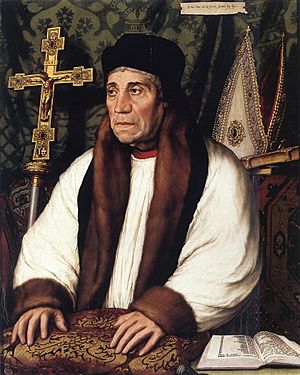Submission of the Clergy facts for kids
The Submission of the Clergy was an important event in English history where the Catholic Church in England agreed to let the King control their power to make church laws. This agreement meant they couldn't create new church rules without the King's permission. It was first agreed upon by a group of church leaders called the Convocation of Canterbury in 1532. Later, the Parliament made it a law in 1534. This act, along with others passed by Parliament, helped to separate the Church in England from the Pope and the Church in Rome.
Contents
Church Leaders Meet the King's Demands
In April 1532, a group of important church leaders, known as the Convocation of Canterbury, met. On May 10, Edward Foxe, who was the Bishop of Hereford, showed them three important demands from King Henry VIII. The King wanted the church leaders to agree to these demands.
The King's demands were:
- The Church of England had to give up its power to make church laws (called canons) without the King's permission.
- The Convocation had to show all their existing church laws to a special committee chosen by the King. This committee would have members from both Parliament and the clergy. They would decide which laws were okay and which ones needed to be removed.
- The Convocation could only keep the remaining church laws if the King agreed to them.
After these demands were presented, William Warham, the Archbishop of Canterbury, quickly moved the meeting to a private chapel. There, the demands were read again. Warham then paused the official meeting for three days. He led the bishops to another chapel for a private talk about how to respond to the King. John Fisher, the Bishop of Rochester, was not there, so a group was sent to ask for his opinion. Fisher likely advised them to strongly resist the King.
King Henry VIII's Speech to Parliament
The Convocation was supposed to meet again, but on May 11, King Henry VIII, with his advisors, gave a speech to Parliament. He strongly criticized the clergy. The writer Edward Hall recorded what the King said:
We thought that the clergy of our kingdom were completely our subjects. But now we see that they are only half our subjects, or even barely our subjects. This is because all the church leaders, when they become bishops, make an oath to the Pope. This oath goes completely against the oath they make to us. So, it seems they are the Pope's subjects, not ours. I am giving you copies of both oaths. I ask you to find a way so that we are not tricked by our spiritual subjects.
After much discussion, Archbishop Warham and the Convocation suggested a compromise. They offered not to make new church laws without the King's approval. They also offered to show all their old laws directly to the King for him to approve or reject, instead of to a committee. They also suggested that their power to make laws would only end "during the King's natural life."
The King's Final Decision
The King suddenly ordered Warham to end the meeting. When the church leaders met for the last time on May 15, Warham told them about the King's decision. He then postponed the Convocation until November.
Some of the King's most important advisors then arrived. They demanded that the clergy agree to the King's demands without any changes. These advisors included the Duke of Norfolk and the Earl of Wiltshire. After this hour-long confrontation, the nobles left. The lower-ranking clergy then voted on the King's three demands. Eighteen of them voted "no" to giving up their law-making power. Nineteen voted against the committee for church laws, and against the third demand.
When Archbishop Warham heard about this rejection, he advised the lower clergy to leave. He thought the King's advisors might return. The Duke of Norfolk and others did return a few hours later, but they left after talking with Warham.
The higher-ranking church leaders in the Convocation also voted on the demands. John Longland, the Bishop of Lincoln, and John Stokesley, the Bishop of London, spoke in favor of the demands, but with some doubts. John Clerk, the Bishop of Bath and Wells, was strongly against them. However, most of the higher-ranking leaders voted for the demands. After this, the Convocation meeting was postponed.
On May 16, the "Submission of the Clergy," as the three demands became known, was officially signed by representatives of the clergy and the bishops. Historian Michael Kelly noted that not many people were present for the vote. He wrote that the Submission was agreed to by a "rump Convocation," meaning a small, unrepresentative group.
Parliament Makes it Law
In 1534, the Submission of the Clergy was made into a law by Parliament. This law was called the Act for the Submission of the Clergy and Restraint of Appeals. Historian Stanford Lehmberg believes that the idea for Parliament to make this a law might have come from the House of Commons, rather than from Thomas Cromwell, who was a key advisor to the King.
The process for this Act involved a meeting between the King and Parliament. The Speaker of the House of Commons spoke directly to the King. In 1536, Parliament was asked again to pass the Submission of the Clergy into law, even though the 1534 Act did not have an end date. The reason for this second request is not fully known.
See also
 | William L. Dawson |
 | W. E. B. Du Bois |
 | Harry Belafonte |


